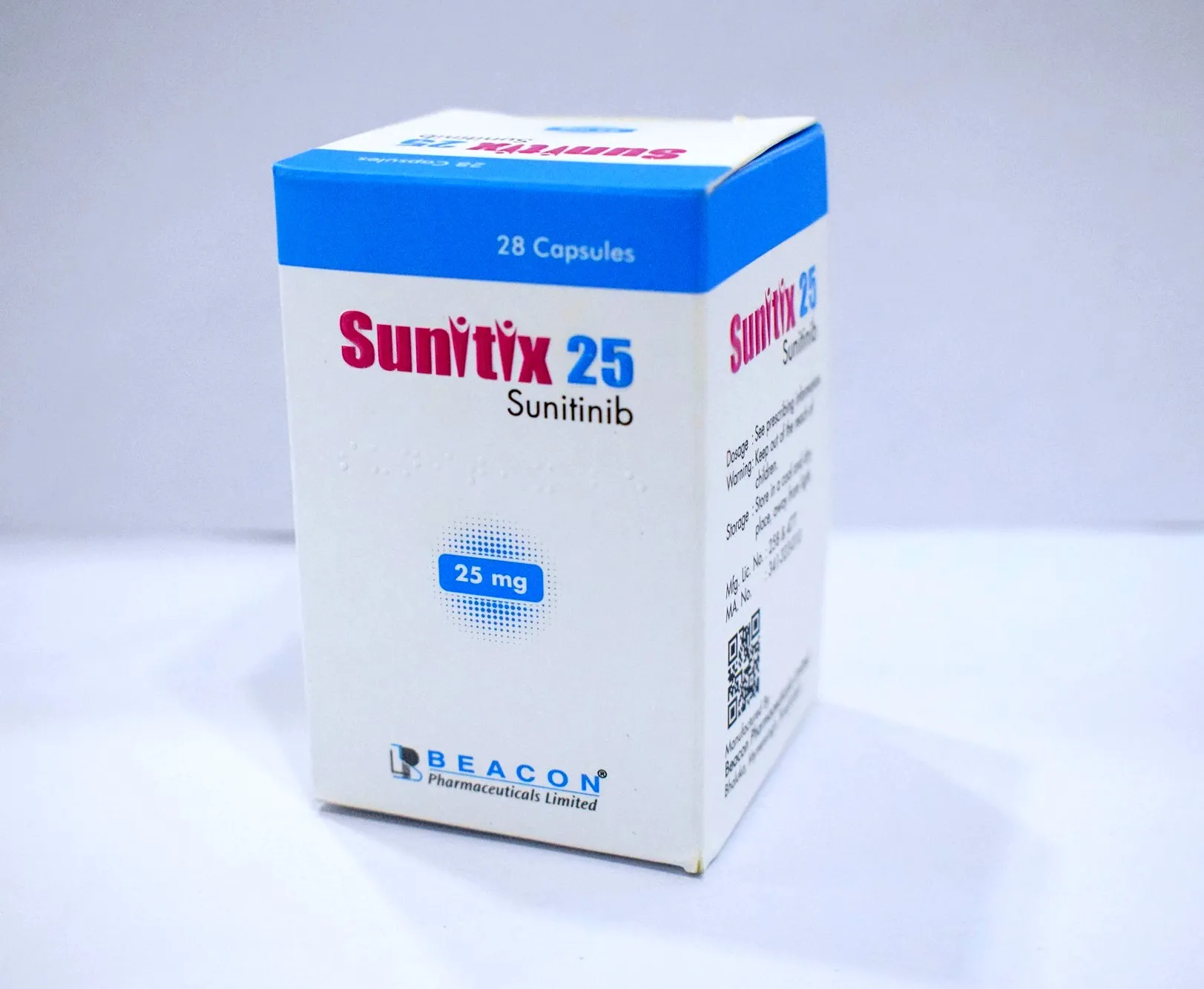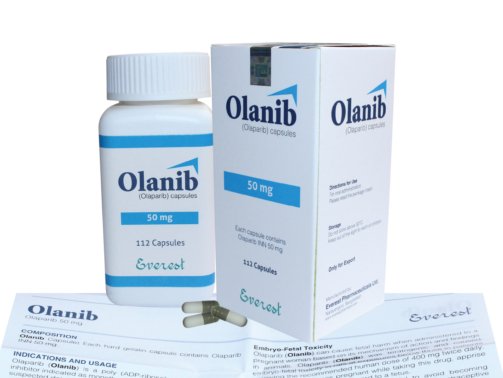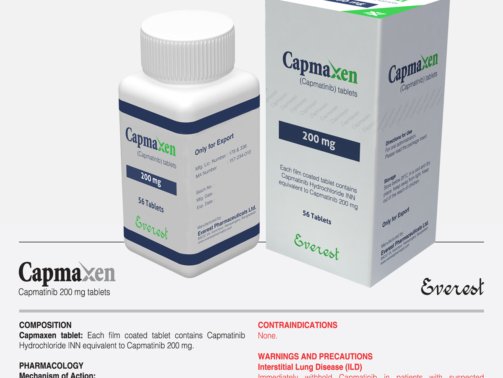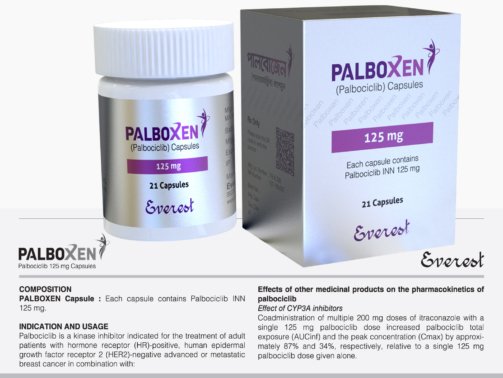Sunitinib 25 mg (Sutent)
0.00$
Sunitix (Sunitinib) is an orally administered, small-molecule inhibitor that targets multiple receptor tyrosine kinases. It received FDA approval for the treatment of renal cell carcinoma and gastrointestinal stromal tumors that are resistant to imatinib.
Sunitinib, marketed under the brand name Sutent, is an oral medication primarily used in the treatment of certain types of cancer. It belongs to a class of drugs known as tyrosine kinase inhibitors (TKIs), which work by blocking specific enzymes involved in the growth and spread of cancer cells. A common strength that is prescribed based on the patient’s condition, tolerance levels, and bodily response is 25 mg.
Mechanism of Action
Numerous receptor tyrosine kinases (RTKs) are targeted by sunitinib; these RTKs are linked to the development of tumors, pathological angiogenesis (the creation of new blood vessels that nourish tumors), and the spread of cancer. Among these RTKs are those implicated in the signaling pathways that promote the growth and survival of cancer cells, such as platelet-derived growth factor receptors (PDGFRs) and vascular endothelial growth factor receptors (VEGFRs).
Sunitinib helps stop the blood flow to tumors, inhibits their growth, and may even cause them to shrink by blocking these kinases. It works well against a variety of cancers that depend on various signaling pathways because of its multi-targeted strategy.
Indications
A number of malignancies can be treated with sunitinib (Sutent) 25 mg, including:
The most prevalent kind of kidney cancer in adults is called renal cell carcinoma (RCC).
Gastric Stromal Tumor (GIST): Particularly in those who are intolerant or resistant to imatinib (Gleevec).
Pancreatic Neuroendocrine Tumors (pNET): Particularly when the tumors are well-differentiated, progressive, incurable, or metastatic.
Advanced or Metastatic Soft Tissue Sarcoma: Depending on clinical judgment, off-label use may be taken into consideration in some situations.
Dosage and Administration
Sunitinib 25 mg (Sutent) is typically given orally once a day, with or without food. For the majority of indications, the usual dosage is 50 mg per day for 4 weeks, followed by a 2-week break, for a total of 6 weeks. However, the dosage could be lowered to 37.5 mg or even 25 mg daily, depending on the patient’s condition and tolerance.
The dosage of 25 mg is particularly beneficial for:
Patients who take larger doses and suffer from severe negative effects
Patients that are elderly or fragile
Titration of doses during treatment modifications
Therapy for long-term maintenance
It is recommended that capsules be consumed whole rather than broken, chewed, or crushed. For best results, timing must be consistent and the recommended routine must be followed.
Side Effects
Sunitinib, like many cancer treatments, has the potential to have major side effects. Typical adverse effects consist of:
Weakness or fatigue
Having diarrhea
Vomiting and feeling queasy
Appetite loss
Sores in the mouth
alterations in the color of the skin or hair (typically yellow discolouration)
Hypertension, or elevated blood pressure,
Pain, swelling, or redness on the palms and soles are symptoms of hand-foot syndrome.
Modified perception of flavor
More serious adverse effects could include:
Heart issues, such as heart failure
Severe hemorrhage or bleeding
Toxicology of the liver
Low levels of blood cells
The most prevalent type of thyroid dysfunction is hypothyroidism.
Perforation of the stomach (rare but dangerous)
Regular blood pressure checks, full blood counts, and thyroid and liver function tests are recommended during treatment.
Contraindications and Precautions
Sunitinib should be avoided or used with caution in:
Women who are pregnant or nursing: It could be harmful to the unborn child.
Due of possible cardiac damage, those with severe heart disease should be avoided.
If you have liver or kidney damage, you may need to change your dosage.
Patients who have bleeding problems or are taking anticoagulants are at higher risk of bleeding.
Patients should disclose all prescription drugs, dietary supplements, and underlying medical issues to their healthcare provider prior to beginning treatment.
Drug Interactions
Sunitinib is metabolized primarily by the liver enzyme CYP3A4. Drugs that influence this enzyme can alter Sunitinib’s levels in the body:
CYP3A4 inhibitors (e.g., ketoconazole, erythromycin) may increase Sunitinib blood levels and toxicity.
CYP3A4 inducers (e.g., rifampin, St. John’s Wort) may reduce its effectiveness.
A complete medication review should be done before initiation and throughout treatment.
Storage and Handling
Sunitinib 25 mg capsules should be kept out of direct sunlight and at room temperature (20°C to 25°C, or 68°F to 77°F). Keep the medication in its original container and out of the reach of dogs and children.
Support and Monitoring for Patients
In order to track treatment response and manage any adverse effects, patients using Sutent should schedule routine follow-up appointments with their oncologist or other healthcare professional. Given how physically and mentally taxing cancer treatment can be, emotional and psychological care is also crucial.
Conclusion
A useful oral cancer treatment that provides a targeted approach to treating a number of challenging-to-treat malignancies is sunitinib 25 mg (Sutent). Although it has helped many patients, its usage needs to be carefully managed because it might have serious negative effects. Individualized dosage and appropriate monitoring can make sunitinib an essential part of successful cancer treatment.
Order Now At Mdx Pharma bd….
To order from MDX Pharma BD, visit their website at https://mdxpharmabd.com, where you can browse products and place orders online. For inquiries or orders via email, contact emedicarepharma@gmail.com. Alternatively, call (+88) 01929123476. Their address is 29, Abdullahpur, Uttara, Dhaka-1230, Bangladesh.
1. Sunitinib: How does it work?
Sutinib inhibits certain proteins (receptor tyrosine kinases) that are involved in the development of blood vessels (angiogenesis), the proliferation of cancer cells, and the spread of tumors.
2. How should I take Sunitinib 25 mg?
Take Sunitinib exactly as prescribed by your doctor—usually once daily, with or without food. It is often given in cycles, such as 4 weeks on treatment followed by 2 weeks off.
3. Can I take Sunitinib with other medications?
In response, sunitinib may interact with a variety of medications, particularly those that impact the CYP3A4 enzyme (such as rifampin and ketoconazole). You should always let your doctor know about all of your vitamins and drugs.
4. Is Sunitinib safe during pregnancy or breastfeeding?
Sunitinib can harm an unborn baby and is not recommended during pregnancy or breastfeeding. During treatment and for at least four weeks following drug cessation, use an effective form of birth control.
5. What should I do if I forget to take a dose?
Take the missed dose as soon as you remember to. Skip the next dose if it’s almost here. Avoid doing two things at once. Consult your doctor or pharmacist for advice at all times.
| Product Name | Sunitix |
|---|---|
| Generic Name | Sunitinib |
| Formulation | Capsule |
| Available Pack Size | 28 |
| Available Strength | 25mg |

 Cart is empty
Cart is empty 



